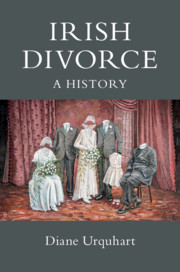'Covering the past four hundred years, this is a major contribution to legal, social and gender history. Urquhart’s work is highly revealing about the double-standards towards sexual behaviour, Irish exceptionalism, Catholic and Protestant attitudes towards moral questions, and absence of legal uniformity under the Union.'
Mary E. Daly - University College Dublin
'This is a superb book - ambitious in scope, yet securely anchored in a formidable array of sources: it is characterised both by judiciousness and by an unflagging empathy. Diane Urquhart has rescued a centrally important theme from neglect and over-simplification - and has thereby consolidated her position within the front rank of modern Irish historians.'
Alvin Jackson - University of Edinburgh
'Based on extensive archival research, including parliamentary and court evidence, memoirs, letters, and diaries, Irish Divorce provides a nuanced understanding of a practice that concerned itself with both property and gendered propriety. Urquhart makes a significant contribution to understanding the complicated relationship between church, state, and Irish society since 1700.'
Karen Steele - Texas Christian University
'Urquhart’s book represents an insightful and compassionate foray into a very new field. The first all-Ireland history of divorce, it demonstrates how marriage breakdown reflected society’s need to regulate succession, sexuality, and legitimacy. This exceptional work charts divorce’s role in shaping, and reflecting, modern Ireland’s attitude to gender and citizenship.'
Oonagh Walsh - Glasgow Caledonian University
‘(A) balanced and masterful treatment of complex issues.’
Brian Maye
Source: Irish Times
‘As lucid as it is thorough, Irish Divorce: A History contributes a comprehensive look at a fraught social issue through exhaustive research and careful contextualisation. It offers a profoundly humane and empathetic analysis of what, for many, proved an elusive necessity that was cordoned off—for centuries—by ideological, nationalistic, imperial, and/or political boundaries and further inflected by class and gender. As a result, this study has much to teach us not only about divorce, but also about the ways the self-fashionings and political maneuverings of a nation-state can subvert the very citizens they are purportedly meant to serve …’
Kate Costello-Sullivan
Source: Estudios Irlandeses
Irish Divorce: A History contributes a comprehensive look at a fraught social issue through exhaustive research and careful contextualisation.'
Kate Costello-Sullivan
Source: Electronic Journal of the Spanish Association for Irish Studies



